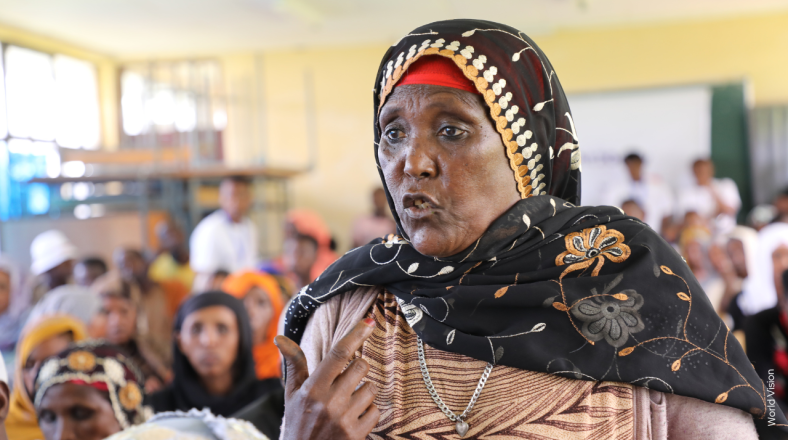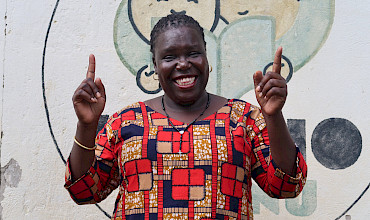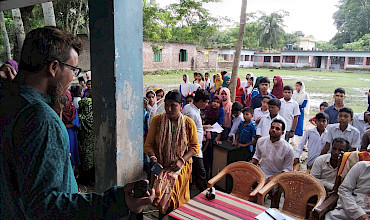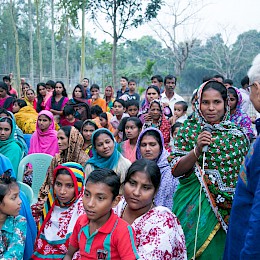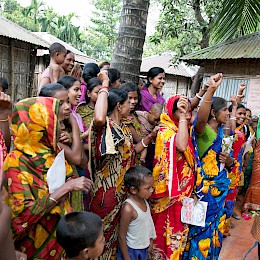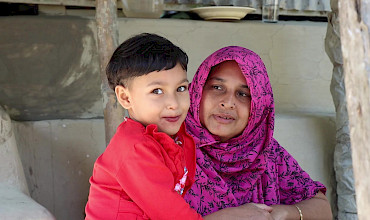
By strengthening civil society and bridging the gap between communities and their governments, Right2Grow believes that we can get to zero undernutrition and zero people without access to basic water, sanitation and hygiene (WASH) services. Women, men and children in affected communities are ready to voice their needs and contribute their own part of the solution. Yet, they are often not given the space and resources to so. Right2Grow facilitates the meaningful inclusion of citizens' voices in policy processes and decision-making. By leveraging their skills and knowledge, citizens become powerful advocates capable to demand the services needed for their children to grow up healthy. Capable of shaping their own futures.
When Nixon Ochatre thought of a name for the grassroots organisation that he wanted to establish ten years ago in his home country Uganda, there was one thing he knew for sure, it had to sound legitimate in the eyes of the community. He needed a name in the local language, something that the people considered their own. Nixon came up with the name ''Amani''. It means ‘ours’ in Lugbara, the language widely spoken in the West Nile region in Uganda: “Amani is not Nixon. Amani is not the government. It is ‘us’. That resonated with the people.”
From the beginning, Amani's mission has been to prevent and respond to teenage pregnancy and child marriage. At first, their participation in the Right2Grow programme may therefore seem unexpected. Yet, Nixon soon explains how Right2Grow's multisectoral approach has been able to strengthen their work with children and young mothers: ''We recognise the pivotal role of nutrition and WASH in the holistic development of children born to young parents, though these elements were initially not central to our focus. Through our collaboration with the Right2Grow programme, that is dedicated to strengthening the capacities of local organisations like ours, we have seamlessly integrated nutrition and WASH outcomes within our overarching child, adolescent and maternal health thematic area.''
Doing more with less
Amani's approach is centered on low-cost, high-impact and community-led solutions. The organisation's biggest strength, says Nixon, is their ability to leverage existing resources and community structures to tackle local issues – hence doing more with less. One of their core engagement strategies is working with 'community change agents': people whom the community respects and trusts to be part of the structure of change. Nixon: “They can be grandmothers, senior women teachers, local council leaders, sub-county chiefs, anyone who the community thinks can play their role well.'' They engage in community dialogues to create awareness on appropriate WASH and nutrition practices and mobilise communities to demand and invest in basic social services. Besides, these members are well positioned to challenge gender norms and stereotypes in nutrition and childcare and encourage couples to take up shared responsibilities in their households.
Based on the belief that programme activities should build on communities' existing strengths, Amani has identified 53 model homes that have embraced healthy nutrition and WASH habits. These homes serve as examples for others to learn from, and typically feature a household vegetable garden, handwashing station and dishwashing rack. Furthermore, in these model homes, responsibilities and decision-making related to childcare and WASH are usually more equally shared between men and women, contributing to improved health and nutrition outcomes for the entire family. Nixon: ''These model homes facilitate peer-to-peer learning and help us to showcase that good examples can be found in people's own villages. People have to start believing in themselves. And realise that they have the internal resources necessary to implement solutions.''
People have to start believing in themselves. And realise that they have the internal resources necessary to implement solutions.
From ambition to action
In Right2Grow, Amani incorporates the methodologies of two consortium partners to mobilise communities for collective action. Through the Hunger Project's Vision, Commitment and Action (VCA) workshops, communities take the first step in shifting their mindsets and creating a future of their own making. From an attitude of resignation towards one of ‘yes we can’ and self-reliance. Through a guided visualisation exercise, people draw their ideal village – where they have enough food, water is safe and accessible, and families can access the services needed for their children to grow up healthy. The VCA methodology helps people to make their dreams a reality by supporting them in making concrete plans to achieve the change they want for themselves, their households, communities and countries.
Amani combines VCA workshops with a citizen-driven accountability approach, developed by World Vision: Citizen, Voice and Action (CVA). CVA is aimed at transforming the dialogue between communities and government in order to improve service delivery. Citizens are equipped to hold their government accountable for the promises they make by learning about their basic service rights and monitoring performance of services against government's own standards. Besides, the methodology also opens the door for community members to voice their own opinions and ideas on what makes a good service. By developing their own indicators and scores for service delivery performance, they are meaningfully engaged in making facilities more responsive to their needs and priorities.
Nixon: “In employing VCA, our communities come together to identify their needs and aspirations, fostering a sense of collective commitment. Meanwhile, CVA allows us to review government commitments, ensuring they align with the practical needs of our people. Our grassroots movement is not just about aid; it's a narrative of communities actively shaping their destiny. Through VCA and CVA, we're crafting a sustainable journey, grounded in the belief that real solutions emerge from the community itself.”
I had a great desire to bring change. This gave me the possibility to really do something for the people in my community.
Citizens taking action
Also in Ethiopia, Right2Grow supports communities to transform their aspirations for change into tangible actions. Based in one of the communities in Muhur Aklil, a district just below the capital of Addis Abeba, religious leader Tibebu Belay was determined to improve the nutritional status of his fellow citizens. Until recently, many families in his village relied on unsafe water for daily household chores, including bathing and dishwashing. And due to a lack of private and secure latrines, some were forced to use open fields or bushes.
Poor hygiene habits and faecal contamination of the environment are major factors causing undernutrition in children. However, many of these cases are entirely preventable, as Tibebu found out during one of Right2Grow's community awareness sessions. The programme helped him to increase his knowledge on good practices and made him learn about his rights to nutrition, WASH and related services. But he didn't just learn. He also took action. “I had a great desire to bring change. This gave me the possibility to really do something for the people in my community.” After participating in Right2Grow's trainings, Tibebu used his influence as a religious leader to promote hygiene and sanitation messages. Furthermore, he joined the CVA Taskforce in his community, through which he and his fellow citizens were equipped with the skills to monitor public services and engage in dialogues with district officials to improve those services. The result: 400 community members now have a toilet. And in neighbouring communities, 128 households, a junior school and a health post successfully secured safe access to water.
Learning from each other
As a partnership, Right2Grow has been able to successfully build on the expertise and knowledge of over 45 civil society organisations to catalyse change. The programme has tried to maximise opportunities for learning, which has led to new ways of working. Misrak Admasu, project manager Right2Grow at The Hunger Project Ethiopia explains: “Our experience has shown that The Hunger Project’s VCA and World Vision’s CVA approach complement one another to empower communities to demand and invest in basic social services and adopt good nutrition and WASH practices. For us as consortium partners this provided an opportunity to learn about each other’s tools and use them consecutively: starting with VCA, followed by CVA.”
Misrak highlights the significant impact of the combined approach on community's well-being in The Hunger Project's implementation area in 2022. Following VCA workshops with 754 community representatives, communities have strengthened their commitment to combat undernutrition and started to implement independent actions to achieve this vision. ''They have constructed and maintained pit latrines, improved their knowledge of children's nutrition, and embraced chicken and vegetable production. They’ve also taken responsibility for keeping their village clean and ensured access to water by maintaining water points. And thanks to the dedicated work of the CVA Taskforce, six health facilities have upgraded their services.”
A relationship of trust
Despite the political instability in Ethiopia, CVA has been able to successfully transform the dialogue between communities and their government. Government agencies are more willing to listen to citizens' voices and have increased their commitment to providing better services. In turn, the community's demand for improved services has gone up. ''Their active involvement in advocating for these improvements is encouraging,” Misrak says. Moreover, CVA has caused decision-makers and CSO's to trust each other more. “We have emphasised that CVA isn't about assigning blame, but rather adopting a win-win approach. Surprisingly, we haven't encountered any major challenges in our advocacy and lobby efforts to expand CVA to the community level across different regions. Our focus is on the effective implementation of food and nutrition policies in Ethiopia. Decision-makers trust our programme because of its emphasis on policy effectiveness.”
Sustainable progress
Right2Grow recognises that sustainable change can only happen when initiated from the grassroots, with changemakers, such as Tibebu, who are leading change from within. As highlighted by Misrak and Nixon, the community places trust in its own leaders, making them particularly effective in driving positive change. Tools such as VCA and CVA offer communities the skills and resources to take responsibility for their own lives and effectively claim their rights to better food, nutrition and WASH services. The approaches have increased their capacity to influence decision-makers and speak with a loud collective voice - allowing them to move from ambition to action. Because getting to zero - by joining forces, we can.
Back to overview